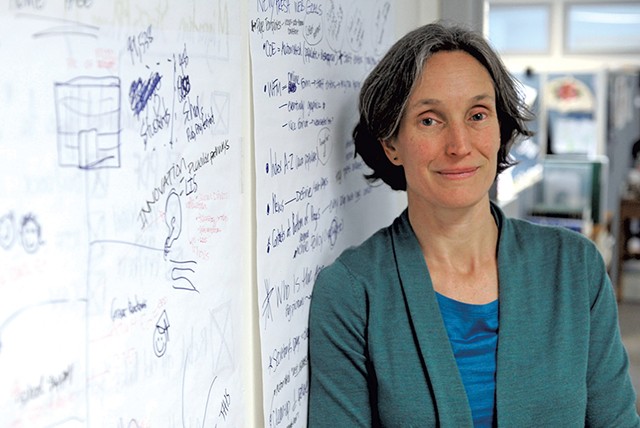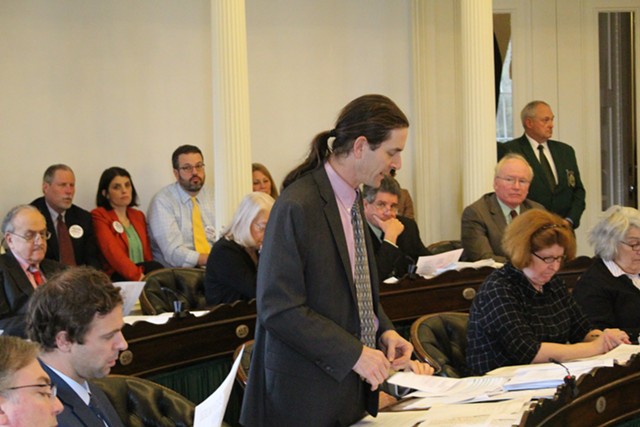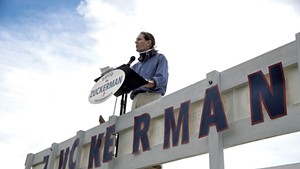As Outbreak Spreads, Holcombe Questions Zuckerman's Vaccination Stance
by Paul Heintz

- Jeb Wallace-Brodeur
- David Zuckerman announcing his candidacy for governor
In the story, former education secretary Rebecca Holcombe criticized her opponent, Lt. Gov. David Zuckerman, for his past opposition to mandatory vaccination. "It's scary that anyone in public office or seeking public office would cast doubt about the value of vaccines," she said. "It's unbelievable this is even up for debate."
Zuckerman, meanwhile, slammed Holcombe for engaging in such a debate during a public health crisis. "The fact that any political campaign is trying to use this moment for political opportunism is unconscionable," he told Politico.
Precisely how Zuckerman's record came to Politico's attention is not clear. Holcombe and her campaign manager, Cameron Russell, told Seven Days that her team did not pitch it to the national news outlet. But since the story's publication, Russell has contacted multiple Vermont news organizations seeking follow-up coverage.
"Rebecca disagrees strongly with the Lt. Governor on this issue, and I wanted to be be sure you all were in the loop on this story," he wrote Seven Days on Saturday. "I've already spoken with Vermont Digger about likely coverage tomorrow, Sunday, March 22nd. Could you let me know if you or anyone else at 7Days would be interested in covering this story?"
Holcombe's supporters appear cognizant of the risks of campaigning during a pandemic. After sharing the Politico story on Facebook, Burlington Democratic Party vice chair Joanna Grossman encouraged her friends to do the same and to text it to others. "Rebecca could run a texting campaign on this in theory but it would be perceived as u[b]er negative if it came from her," she wrote. "I think it's way more viable if it comes from us — ya know the people."
Grossman, a Holcombe supporter, followed up with a sample script for others to use: "Hey ____! Hope you guys are doing ok surviving life in the time of corona! I wanted to reach out because I recently learned that David Zuckerman is anti-vax. That really makes me uncomfortable because ______. I wanted to make sure you’re aware."

- File: Jeb Wallace-Brodeur
- Rebecca Holcombe
"Gov. Scott's response to the coronavirus is inadequate," she wrote on Twitter last week. "The administration must move faster & more aggressively."
In an interview with Seven Days, Zuckerman said it was perfectly appropriate to debate vaccination policy, but he argued that now is not the time.
"We are still in the emergency, and while it may be frustrating that there is little coverage of politics for those that think campaigning is more important than public health, I believe that my time is better spent serving as lieutenant governor and addressing constituents' concerns and addressing the needs of our health care workers than spending time politicking in this way," he said.
Related LG Candidate David Zuckerman Vexes Voters With Vax Stance

LG Candidate David Zuckerman Vexes Voters With Vax Stance
By Terri Hallenbeck
Politics
"In the context of coronavirus, when we know we need to save every single bed for those patients who may need them, we need to make sure that people who can be vaccinated for preventable diseases, we ought to be taking those steps to save those beds for people for whom it's a matter of life and death," she said.
As for Zuckerman's views? "This is an issue in which we have a significant disagreement," Holcombe said. "I think we need to be practicing leadership that relies on facts and science."
The policy debate centers on a 2015 vote in the state Senate over whether to require more Vermont children to be vaccinated in order to attend school. For years, Vermont had allowed parents to seek philosophical, religious or medical waivers to the mandate. That April, several senators sought to amend an unrelated bill to remove the philosophical exemption, arguing that doing so would make children safer by increasing herd immunity.
When the amendment first came up, as Seven Days reported at the time, Zuckerman questioned the science behind vaccinations and argued that the pharmaceutical industry was pushing vaccines to make money, not improve public health.
"For me, as long as there's the extreme financial conflicts of interest out there that are driving much of this debate and discussion, I have to maintain the individual right for someone to do their own research as well and make that decision," said Zuckerman, who was serving in the Senate at the time.

- Paul Heintz
- David Zuckerman arguing against eliminating the philosophical exemption to Vermont's vaccine mandate during an April 2015 Senate debate
Speaking on the Senate floor that day, Zuckerman said vaccination science was "disputed" and argued that the human body was sacrosanct. "We are adjusting the laws of our state to such that someone else is determining — we in this room are determining — what is going to go into every single person's body," he said, according to a Seven Days account of that debate.
Related Senate Votes to Nix Philosophical Exemption to Vaccine Mandate

Senate Votes to Nix Philosophical Exemption to Vaccine Mandate
By Paul Heintz
Off Message
He explained that his father, a thoracic surgeon, had died of stomach cancer when Zuckerman was 13 years old — likely because the risks of a radiological procedure he performed were unknown at the time.
"Why do I tell you this? Because science is good, but it is not perfect," he told his colleagues at the time. "Such imperfection can cause harm. Absolutism can cause harm."
The 2015 vote has dogged Zuckerman in subsequent elections. When he first ran for lieutenant governor the next year, Republican opponent Randy Brock ran radio ads accusing him of backing laws "that would expose our schoolchildren to dangerous diseases by discouraging vaccinations." Zuckerman responded that he trusted science and had vaccinated his own daughter, but that others who had bad reactions to vaccines should be able to opt out of them.
Now that he's running for governor, Zuckerman says that if he were faced with a vote similar to the one he took in 2015, he would "probably not" vote the same way. "My position is very clear that I support our current law," he said. "The bottom line is, I support vaccines and I've always believed in their efficacy."
Zuckerman also now claims that he voted for the underlying bill after his amendment failed — an assertion that cannot be verified because no roll-call was requested. He also claims that his position has not changed.
"I had the same view then as I have now with respect to the efficacy of vaccines and that vaccines are a good thing for the health of society," Zuckerman said. "So I don't know that I'm actually changing in that regard."
Related Stories
-

Holcombe Amplifies Attack on Zuckerman's Vaccine Record
by Paul Heintz July 21, 2020
-

As the Primary Looms, Some Candidates Emerge From Isolation to Stump
by Kevin McCallum June 30, 2020
-

EMILY's List Endorses Rebecca Holcombe for Governor
by Paul Heintz June 23, 2020
-

LG Candidate David Zuckerman Vexes Voters With Vax Stance
by Terri Hallenbeck October 26, 2016
-

Senate Votes to Nix Philosophical Exemption to Vaccine Mandate
by Paul Heintz April 22, 2015
Speaking of...
-

On the Beat: maari Drops 'Eyes Wide Shut,' and a Farewell Show for Pete Sutherland
Apr 17, 2024 -

Lt. Gov. Zuckerman Goes on a 'Banned Books Tour'
Sep 6, 2023 -

Mirroring a National Trend, RSV Hospitalizations Rise in Vermont
Oct 25, 2022 -

Q&A: Candidates for Lieutenant Governor
Sep 27, 2022 -

Candidates for Governor Display Stark Differences at Tunbridge Fair Debate
Sep 16, 2022 - More »





Comments (11)
Showing 1-11 of 11
Comments are closed.
From 2014-2020, Seven Days allowed readers to comment on all stories posted on our website. While we've appreciated the suggestions and insights, right now Seven Days is prioritizing our core mission — producing high-quality, responsible local journalism — over moderating online debates between readers.
To criticize, correct or praise our reporting, please send us a letter to the editor or send us a tip. We’ll check it out and report the results.
Online comments may return when we have better tech tools for managing them. Thanks for reading.